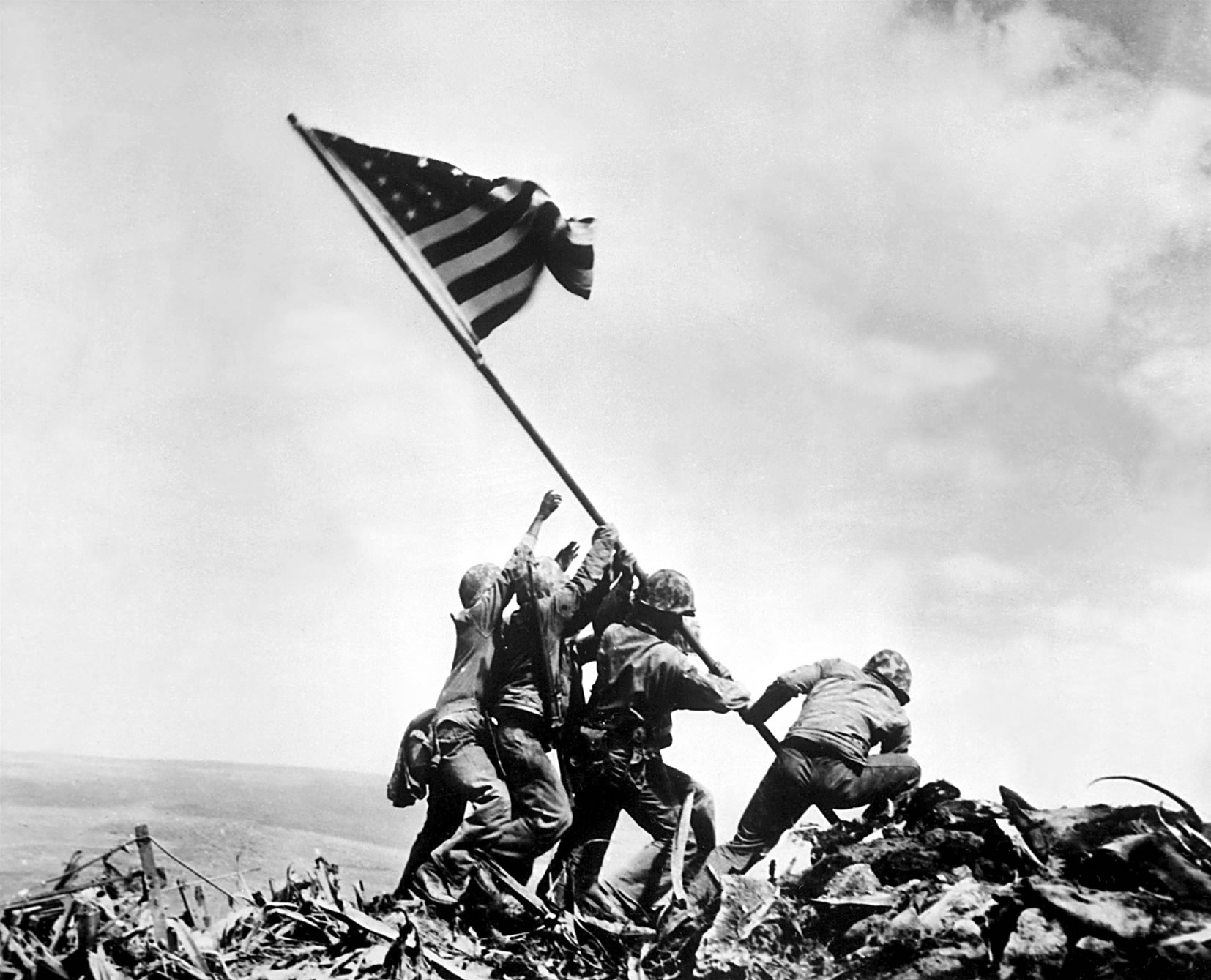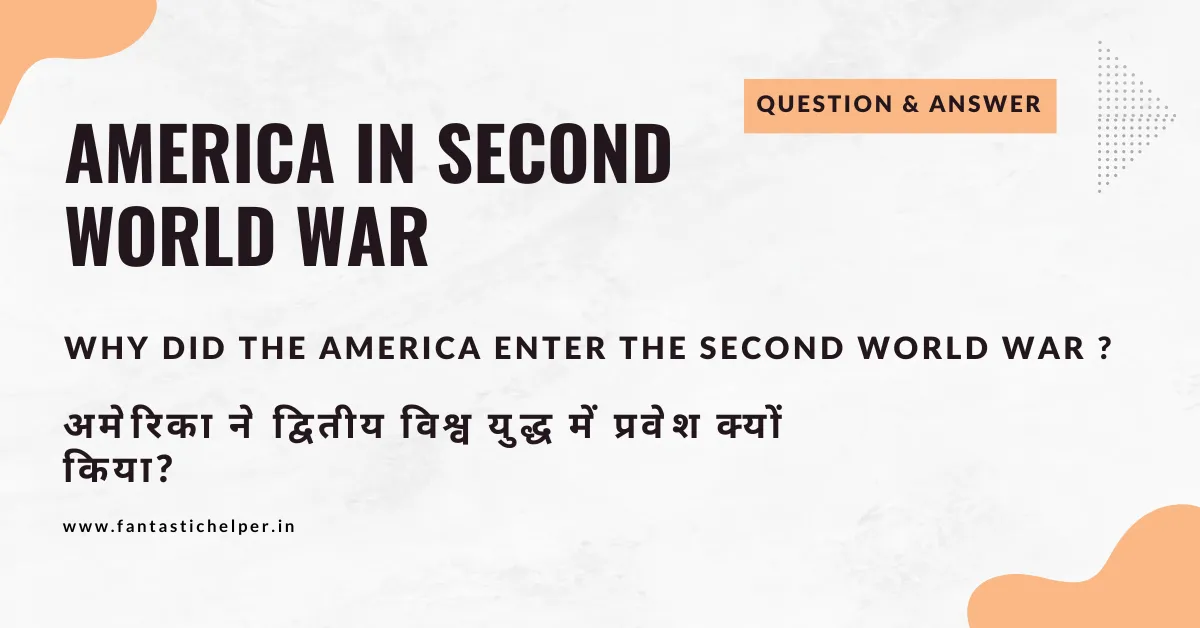Question:Why did The America enter the Second World War ?

Introduction about second world war
The Second World War, spanning from 1939 to 1945, stands as one of the most significant and catastrophic conflicts in human history. Triggered by a complex web of political tensions, territorial ambitions, economic disparities, and unresolved grievances from the aftermath of the First World War, the conflict engulfed nations across the globe in a devastating maelstrom of violence and destruction.
At its core, the Second World War pitted two major alliances against each other: the Axis Powers, led by Nazi Germany, Imperial Japan, and Fascist Italy, and the Allied Powers, comprised primarily of the United States, the Soviet Union, and the United Kingdom, among others. The conflict was characterized by large-scale military campaigns, brutal warfare on multiple fronts, and the unprecedented use of technological advancements in weaponry and tactics.
The war saw the emergence of totalitarian regimes, genocide, and widespread atrocities, most notably the Holocaust, in which six million Jews, along with millions of others, were systematically exterminated by the Nazis. The conflict also witnessed immense civilian suffering, as cities were bombed, populations displaced, and entire societies uprooted by the ravages of war.
The Second World War ultimately concluded with the defeat of the Axis Powers in 1945, but not before leaving a profound and enduring impact on the world. Its aftermath reshaped the geopolitical landscape, ushered in the atomic age, and laid the groundwork for the Cold War rivalry between the United States and the Soviet Union. Moreover, the war spurred movements for decolonization, advancements in human rights, and efforts to establish international institutions aimed at preventing such cataclysmic conflicts in the future.
In essence, the Second World War stands as a stark reminder of the destructive potential of human conflict, while also serving as a testament to the resilience, sacrifice, and courage displayed by those who endured its trials and tribulations.
Reason of Entering of America in The second world War
America entered the Second World War primarily in response to the attack on Pearl Harbor by the Imperial Japanese Navy on December 7, 1941. Prior to this event, the United States had maintained a policy of neutrality in the conflict, despite providing material support to Allied nations, particularly the United Kingdom and the Soviet Union, through programs such as Lend-Lease.
The attack on Pearl Harbor, which resulted in significant loss of life and destruction of American naval assets, prompted the United States to declare war on Japan the following day. This action marked America’s formal entry into the war, as it joined the Allied Powers in their struggle against the Axis forces.
The decision to enter the war was further reinforced by the subsequent declarations of war against the United States by Nazi Germany and Fascist Italy, allies of Japan through the Tripartite Pact. With all three Axis Powers now at war with the United States, the nation found itself fully engaged in the global conflict.
Beyond the immediate provocation of the Pearl Harbor attack, there were also broader geopolitical and ideological factors that influenced America’s decision to enter the war. The rise of totalitarian regimes in Europe and Asia, particularly Nazi Germany under Adolf Hitler and Imperial Japan under Emperor Hirohito, posed a direct threat to the principles of democracy, freedom, and international stability that the United States sought to uphold.
Additionally, there was growing concern within the American government and public about the spread of fascist aggression and atrocities, such as the Holocaust in Europe and Japan’s brutal occupation of East Asia. There was a sense of moral obligation to confront these grave injustices and to stand in solidarity with Allied nations fighting against tyranny and oppression.
In summary, America entered the Second World War primarily in response to the attack on Pearl Harbor, which directly threatened its national security and sovereignty. However, broader considerations of ideological conflict, moral duty, and the defense of democratic principles also played significant roles in shaping the nation’s decision to join the Allied cause against the Axis Powers.
द्वितीय विश्व युद्ध का परिचय
1939 से 1945 तक चला द्वितीय विश्व युद्ध, मानव इतिहास में सबसे महत्वपूर्ण और विनाशकारी संघर्षों में से एक है। प्रथम विश्व युद्ध के बाद राजनीतिक तनावों, क्षेत्रीय महत्वाकांक्षाओं, आर्थिक असमानताओं और अनसुलझी शिकायतों के एक जटिल जाल से उत्पन्न इस संघर्ष ने दुनिया भर के देशों को हिंसा और विनाश के विनाशकारी भंवर में उलझा दिया।
इसके मूल में, द्वितीय विश्व युद्ध ने दो प्रमुख गठबंधनों को एक-दूसरे के खिलाफ खड़ा कर दिया: नाजी जर्मनी, इंपीरियल जापान और फासीवादी इटली के नेतृत्व वाली धुरी शक्तियां, और सहयोगी शक्तियां, जिनमें मुख्य रूप से संयुक्त राज्य अमेरिका, सोवियत संघ और शामिल थे। यूनाइटेड किंगडम, दूसरों के बीच में। इस संघर्ष की विशेषता बड़े पैमाने पर सैन्य अभियान, कई मोर्चों पर क्रूर युद्ध और हथियार और रणनीति में तकनीकी प्रगति का अभूतपूर्व उपयोग था।
युद्ध में अधिनायकवादी शासन, नरसंहार और व्यापक अत्याचारों का उदय हुआ, विशेष रूप से नरसंहार, जिसमें लाखों अन्य लोगों के साथ छह मिलियन यहूदियों को नाज़ियों द्वारा व्यवस्थित रूप से नष्ट कर दिया गया था। इस संघर्ष में भारी नागरिक पीड़ा भी देखी गई, क्योंकि शहरों पर बमबारी की गई, आबादी विस्थापित हो गई और युद्ध के कहर से पूरा समाज उखड़ गया।
द्वितीय विश्व युद्ध अंततः 1945 में धुरी शक्तियों की हार के साथ समाप्त हुआ, लेकिन दुनिया पर गहरा और स्थायी प्रभाव छोड़ने से पहले नहीं। इसके परिणाम ने भू-राजनीतिक परिदृश्य को नया आकार दिया, परमाणु युग की शुरुआत हुई और संयुक्त राज्य अमेरिका और सोवियत संघ के बीच शीत युद्ध की प्रतिद्वंद्विता की नींव रखी। इसके अलावा, युद्ध ने उपनिवेशवाद को ख़त्म करने, मानवाधिकारों में प्रगति और भविष्य में ऐसे विनाशकारी संघर्षों को रोकने के उद्देश्य से अंतर्राष्ट्रीय संस्थानों की स्थापना के प्रयासों को प्रेरित किया।
संक्षेप में, द्वितीय विश्व युद्ध मानव संघर्ष की विनाशकारी क्षमता की एक कड़ी याद दिलाता है, साथ ही उन लोगों द्वारा प्रदर्शित लचीलेपन, बलिदान और साहस के प्रमाण के रूप में भी काम करता है जिन्होंने इसके परीक्षणों और कष्टों को सहन किया।
द्वितीय विश्व युद्ध में अमेरिका के प्रवेश का कारण
7 दिसंबर, 1941 को इंपीरियल जापानी नौसेना द्वारा पर्ल हार्बर पर हमले के जवाब में अमेरिका ने मुख्य रूप से द्वितीय विश्व युद्ध में प्रवेश किया। इस घटना से पहले, संयुक्त राज्य अमेरिका ने मित्र देशों को सामग्री सहायता प्रदान करने के बावजूद, संघर्ष में तटस्थता की नीति बनाए रखी थी। लेंड-लीज़ जैसे कार्यक्रमों के माध्यम से राष्ट्रों, विशेष रूप से यूनाइटेड किंगडम और सोवियत संघ।
पर्ल हार्बर पर हमला, जिसके परिणामस्वरूप बड़ी संख्या में लोगों की जान चली गई और अमेरिकी नौसैनिक संपत्ति नष्ट हो गई, ने अगले दिन संयुक्त राज्य अमेरिका को जापान के खिलाफ युद्ध की घोषणा करने के लिए प्रेरित किया। इस कार्रवाई ने युद्ध में अमेरिका के औपचारिक प्रवेश को चिह्नित किया, क्योंकि यह धुरी बलों के खिलाफ उनके संघर्ष में मित्र देशों में शामिल हो गया।
त्रिपक्षीय संधि के माध्यम से जापान के सहयोगियों, नाजी जर्मनी और फासीवादी इटली द्वारा संयुक्त राज्य अमेरिका के खिलाफ युद्ध की बाद की घोषणाओं से युद्ध में प्रवेश करने के निर्णय को और भी बल मिला। अब संयुक्त राज्य अमेरिका के साथ युद्ध में तीनों धुरी शक्तियों के साथ, राष्ट्र ने खुद को वैश्विक संघर्ष में पूरी तरह से शामिल पाया।
पर्ल हार्बर हमले के तत्काल उकसावे के अलावा, व्यापक भूराजनीतिक और वैचारिक कारक भी थे जिन्होंने युद्ध में प्रवेश करने के अमेरिका के निर्णय को प्रभावित किया। यूरोप और एशिया में अधिनायकवादी शासन के उदय, विशेष रूप से एडॉल्फ हिटलर के तहत नाजी जर्मनी और सम्राट हिरोहितो के तहत इंपीरियल जापान ने लोकतंत्र, स्वतंत्रता और अंतरराष्ट्रीय स्थिरता के सिद्धांतों के लिए सीधा खतरा पैदा कर दिया, जिसे संयुक्त राज्य अमेरिका ने बनाए रखने की मांग की थी।
इसके अतिरिक्त, अमेरिकी सरकार और जनता के भीतर फासीवादी आक्रामकता और अत्याचारों के प्रसार, जैसे कि यूरोप में नरसंहार और पूर्वी एशिया में जापान के क्रूर कब्जे के बारे में चिंता बढ़ रही थी। इन गंभीर अन्यायों का सामना करने और अत्याचार और उत्पीड़न के खिलाफ लड़ने वाले मित्र राष्ट्रों के साथ एकजुटता से खड़े होने के नैतिक दायित्व की भावना थी।
संक्षेप में, अमेरिका ने मुख्य रूप से पर्ल हार्बर पर हमले के जवाब में द्वितीय विश्व युद्ध में प्रवेश किया, जिससे सीधे तौर पर उसकी राष्ट्रीय सुरक्षा और संप्रभुता को खतरा था। हालाँकि, वैचारिक संघर्ष, नैतिक कर्तव्य और लोकतांत्रिक सिद्धांतों की रक्षा के व्यापक विचारों ने भी धुरी शक्तियों के खिलाफ मित्र देशों में शामिल होने के देश के फैसले को आकार देने में महत्वपूर्ण भूमिका निभाई।
द्वितीय विश्व युद्ध का प्रभाव एवं परिणाम
द्वितीय विश्व युद्ध का प्रभाव और परिणाम गहरा और दूरगामी थे, जिसने आने वाले दशकों के लिए इतिहास की दिशा तय की। यहां युद्ध के कुछ प्रमुख प्रभाव और परिणाम दिए गए हैं:
- मानव हताहत: द्वितीय विश्व युद्ध के परिणामस्वरूप चौंका देने वाली मानव क्षति हुई, अनुमान है कि संघर्ष के प्रत्यक्ष परिणाम के रूप में 60 मिलियन से अधिक लोगों ने अपनी जान गंवाई। इसमें सैन्य कर्मी और नागरिक दोनों शामिल थे, जिनमें से कई बमबारी, लड़ाई, नरसंहार और अन्य अत्याचारों में मारे गए।
- बुनियादी ढांचे का विनाश: युद्ध के कारण पूरे यूरोप, एशिया और संघर्ष में शामिल अन्य क्षेत्रों में बुनियादी ढांचे, शहरों और अर्थव्यवस्थाओं का व्यापक विनाश हुआ। औद्योगिक केंद्रों पर बमबारी की गई, परिवहन नेटवर्क बाधित हो गए और कृषि उत्पादन प्रभावित हुआ, जिससे व्यापक तबाही और कठिनाई हुई।
- राजनीतिक पुनर्गठन: युद्ध के बाद के युग में महत्वपूर्ण राजनीतिक पुनर्गठन देखा गया, जिसमें दो महाशक्तियों, संयुक्त राज्य अमेरिका और सोवियत संघ का उदय शामिल था, जिनकी प्रतिद्वंद्विता शीत युद्ध के युग के दौरान वैश्विक राजनीति को आकार देगी। नाज़ी जर्मनी और शाही जापान की हार के कारण उनके साम्राज्य नष्ट हो गए और यूरोप और एशिया में राष्ट्रीय सीमाओं का पुनर्निर्धारण हुआ।
- अंतर्राष्ट्रीय संगठनों की स्थापना: युद्ध की भयावहता के जवाब में, राष्ट्रों के बीच शांति, सहयोग और सामूहिक सुरक्षा को बढ़ावा देने के उद्देश्य से अंतर्राष्ट्रीय संगठनों की स्थापना के प्रयास किए गए। संयुक्त राष्ट्र की स्थापना 1945 में भविष्य के संघर्षों को रोकने और अंतरराष्ट्रीय विवादों के राजनयिक समाधान को बढ़ावा देने के लक्ष्य के साथ की गई थी।
- तकनीकी प्रगति: द्वितीय विश्व युद्ध में सैन्य प्रौद्योगिकी और रणनीति में तेजी से प्रगति देखी गई, जिसमें परमाणु हथियार, रडार सिस्टम, जेट प्रणोदन और अन्य नवाचारों का विकास शामिल था, जिनका युद्ध और वैश्विक सुरक्षा पर स्थायी प्रभाव पड़ेगा।
- आर्थिक सुधार और विकास: व्यापक विनाश के बावजूद, युद्ध के बाद की अवधि में भी उल्लेखनीय आर्थिक सुधार और विकास देखा गया, विशेष रूप से संयुक्त राज्य अमेरिका जैसे देशों में, जिसने अभूतपूर्व समृद्धि की अवधि का अनुभव किया जिसे “युद्धोत्तर आर्थिक उछाल” के रूप में जाना जाता है। मार्शल योजना जैसी पहल ने यूरोप में युद्धग्रस्त अर्थव्यवस्थाओं के पुनर्निर्माण के लिए महत्वपूर्ण सहायता प्रदान की, जिससे पुनर्निर्माण और पुनर्प्राप्ति की व्यापक प्रक्रिया में योगदान मिला।
- आघात और स्मृति की विरासत: द्वितीय विश्व युद्ध ने उन लोगों के लिए, जो इससे गुजरे थे, और साथ ही बाद की पीढ़ियों के लिए भी आघात और स्मृति की एक स्थायी विरासत छोड़ी। लोकप्रिय संस्कृति, साहित्य, फिल्म और कला पर युद्ध का प्रभाव अभी भी महसूस किया जा रहा है, जो संघर्ष की मानवीय लागत और शांति बनाए रखने के महत्व की याद दिलाता है।
संक्षेप में, द्वितीय विश्व युद्ध के दुनिया के लिए गहरे और स्थायी परिणाम थे, जिसने राजनीतिक, आर्थिक और सामाजिक परिदृश्य को नया आकार दिया और एक ऐसी विरासत छोड़ी जो आज भी वैश्विक मामलों को प्रभावित कर रही है।

:max_bytes(150000):strip_icc():format(webp)/v-day-in-germany-3134873-5b7636b2c9e77c0057a127ec.jpg)